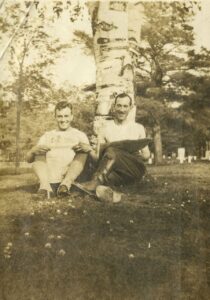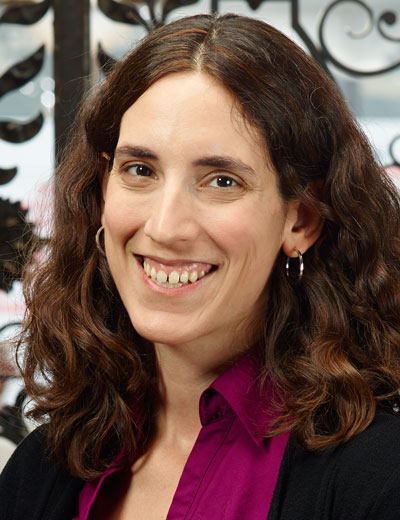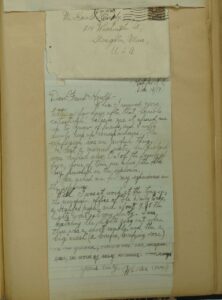Two weeks after an explosion leveled parts of Halifax, Nova Scotia, in December 1917, a survivor named Walter Hoganson wrote a letter to a friend in Stoughton, Massachusetts. In the letter, Hoganson provides a harrowing first-person narrative of the events that occurred the morning of December 6, from the initial blast to the arrival of the Massachusetts Relief Expedition. At the end of his letter, he extols the virtues of the Expedition’s Commissioner-in-Charge, Abraham Ratshesky; Hoganson’s letter was placed with care in Ratshesky’s scrapbook, part of his papers in the Wyner Family Jewish Heritage Center at NEHGS.
First-person narratives are archives’ most enduring materials – they provide those of us in the present with a keener understanding and empathy for those in the past. We often know more than the creator of the letter or diary because we have the benefit of historical perspective. The writer only knew what was happening at that moment in their lives, in their present. Hoganson’s sister, brother-in-law, and nephew, killed in the explosion, can be found listed in the Nova Scotia Archives’ online database. His letter reminds us that they were people, not just numbers amongst the dead, and how our seemingly normal way of life can be abruptly, and irrevocably, changed.
 "Scudder" (left) and Bernard Gorfinkle (right) writing a letter home from Plattsburg, New York, before shipping out to France, 5 August 1917. Gorfinkle’s letters home during WWI served as inspiration for #ForTheFuture.
"Scudder" (left) and Bernard Gorfinkle (right) writing a letter home from Plattsburg, New York, before shipping out to France, 5 August 1917. Gorfinkle’s letters home during WWI served as inspiration for #ForTheFuture.
Two months ago, as the Jewish Heritage Center team confronted the new reality of working from home, we started to think about collecting people’s first-hand accounts of the COVID-19 pandemic. In response, we developed #ForTheFuture. We wanted to know how Jewish communities in New England were responding: How were families preparing for Passover? What were Jewish organizations doing to stay connected? How were families, jobs, and schools affected? What new daily rituals were created to find joy during this time? What do they think will be changed forever by COVID-19?
By actively encouraging people to donate materials about this pandemic, we’re ensuring that there is a record of how our Jewish communities and families responded – how they held together, how they helped others, and how they pivoted to face the challenges of this new COVID-19 era. The team developed a series of prompts, available on our website, for people to use for journaling. We also opened the call for donations to include artwork, photography, video, and oral history interviews.
We are experiencing trauma, and people may not want to respond to this call for materials right now. Because of this, we plan to continue collecting materials pertaining to #ForTheFuture long past when this public health crisis ends. And yet, what has been submitted so far has demonstrated that there is beauty in the quiet streets, and silver linings in the remote Passover Seders, where for the first time, family and friends gathered from across the globe together. Years from now, historians will hear these voices document their witnessing of a changing world – knowing more than we possibly could, but with greater understanding of the impact on us, now.
Jewish individuals, organizations, and communities throughout New England are encouraged to submit to #ForTheFuture. Visit our website for more information on how to submit.
Share this:

About Stephanie Call
Stephanie is the Associate Director of Archives and Education at the Wyner Family Jewish Heritage Center at New England Historic Genealogical Society. She is responsible for overseeing the JHC archival collections, creating educational programming and content, and conducting outreach. Stephanie received a B.A. in English and Jewish Studies from Mount Holyoke College and a M.S. in Library and Information Science with a concentration in Archives Management from Simmons College. She is a member of the Society of American Archivists and the New England Archivists.View all posts by Stephanie Call →
